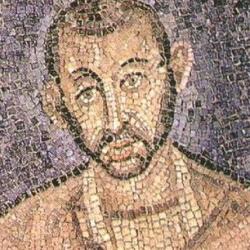
John 15:13 - Verse and Perspectives
"Greater love hath no man than this, that a man lay down his life for his friends."
Analysis of John 15:13 (KJV):
This profound verse from the Gospel of John, attributed to Jesus Christ, beautifully highlights the essence of selfless and sacrificial love. Jesus expresses the highest form of love, where one is willing to lay down their life for the sake of friends. This concept of self-sacrificial love plays a central role in Christian theology, often associated with Christ's own sacrifice on the cross for the salvation of humanity.
Now, let's explore the diverse perspectives from different religious and spiritual traditions:
Christian Perspective:
In Christian theology, John 15:13 holds profound significance, reflecting Jesus Christ's self-sacrificial love. It underscores the foundational doctrine of atonement, where Jesus willingly laid down His life on the cross to redeem humanity's sins. This verse is central to the Christian understanding of salvation through faith in Christ's sacrifice and calls for believers to embody His selfless love in their relationships and actions.
Progressive Christian Perspective:
Within progressive Christianity, John 15:13 is interpreted in the context of a broader commitment to social justice and inclusion. It highlights the imperative for believers to extend sacrificial love, not only to their immediate circle but also to marginalized and oppressed individuals or groups. This interpretation emphasizes the transformative power of love in addressing systemic issues and calls on all who identify as Christians to live out this selfless love in their daily lives.
Catholic Perspective:
The Roman Catholic Church sees John 15:13 as a reflection of Christ's redemptive sacrifice and the importance of friendship and community. It aligns with Catholic teachings on the virtues of charity and self-giving love. Catholics are encouraged to cultivate friendships and foster a sense of community, understanding that the ultimate expression of love is to lay down one's life for others, as Christ did on the cross. According to Roman Catholic thinking, this verse describes the life Christ lived and sets a pattern for faithful Roman Catholics to follow today.
Latter-day Saint (LDS) Perspective:
In LDS theology, John 15:13 aligns with the belief in eternal bonds and relationships. It underscores the significance of loving and serving one's fellow beings, both in mortality and in the eternities. This verse resonates with the Mormon emphasis on family and community, reflecting Christ's example of self-sacrifice in strengthening these eternal bonds. It is a testament to the LDS belief that, like Jesus, individuals should live lives of self-sacrifice, freely given service, and selfless love for their fellow human beings, regardless of their religious affiliation.
Evangelical Perspective:
Evangelical Christians hold John 15:13 in high regard, emphasizing it as a testament to the redemptive love of Jesus Christ. This verse reinforces evangelical teachings on salvation through faith in Christ alone and the need for believers to embody Christ's sacrificial love in their lives. It serves as a foundational text for evangelical ethics and underscores the call to love one's neighbor as oneself, often manifested through their efforts to share the message of Christ with others.
Hindu Perspective:
While not a part of Hindu scripture, the principle of selfless love and sacrifice aligns with the concept of "Karma Yoga" in Hinduism. This philosophy emphasizes performing one's duties and actions selflessly, without attachment to the results, as a means of reducing one's negative karma. The selflessness of John 15:13 resonates with the Hindu practice of "Bhakti" or devotion, where actions are performed as a form of devotion to a deity. This devotion, in turn, is believed to address or remit one's negative karma, similar to the concept of selflessness in the Christian context.
Buddhist Perspective:
Although not a Buddhist scripture, John 15:13 aligns with Buddhist teachings on altruism and the importance of benefiting others through self-sacrifice. It resonates with the Buddhist principle of bodhisattva vows, where one commits to achieving enlightenment for the benefit of all sentient beings rather than for one's own benefit. The Buddha's own acts of compassion, such as eating food he believed to be spoiled to spare his disciples, exemplify this principle of selfless love and sacrifice.
Islamic Perspective:
While not an Islamic scripture, John 15:13 aligns with Islamic teachings on compassion (rahma) and charity (sadaqah). Islam emphasizes selfless acts of kindness and assistance to those in need as expressions of faith. This verse resonates with the broader Islamic principle of serving humanity and being willing to sacrifice for the well-being of others, reflected in several of the Five Pillars of Islam.
Pagan Perspective:
Paganism encompasses various traditions, and there is no direct scriptural equivalent. However, the principle of interconnectedness and harmony with nature and others is paramount. John 15:13 may be viewed as reflecting a deep respect for the interconnectedness of all beings and the importance of fostering positive relationships within the natural world. For practitioners of Paganism, this verse could encourage selfless acts of love and care not only for fellow humans but also for the Earth and all life upon it.
Jewish Perspective:
While John 15:13 is not part of Jewish canon, it emphasizes the importance of love and self-sacrifice, which aligns with Jewish teachings on the value of acts of loving-kindness (chesed) and communal support (kehilah). It underscores the significance of strong bonds within the Jewish community and a commitment to aiding one's fellow Jews in times of need. The message of living a selfless life and sacrificing for others is present in the Hebrew Bible and in the way observant Jews are taught to live their lives.
In conclusion, John 15:13, as found in the Christian Bible, serves as a profound statement about the nature of selfless love and sacrifice. Across various religious and spiritual traditions, this verse is embraced as a testament to the highest form of compassion and devotion. Its message transcends religious boundaries, emphasizing the universality of its timeless and profound message of selfless love.
10/25/2023 6:01:33 PM











